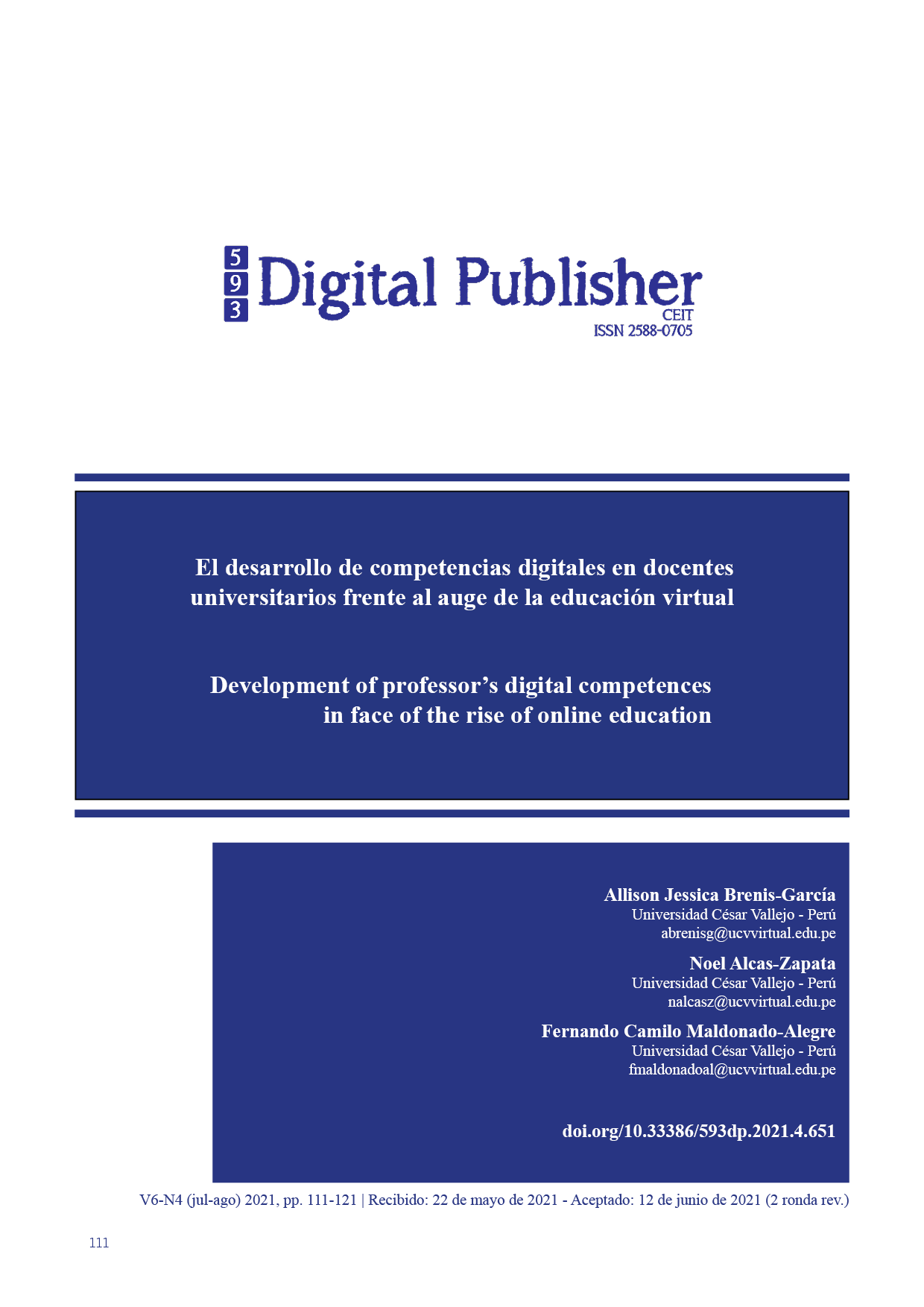Development of professor’s digital competences in face of the rise of online education
Main Article Content
Abstract
At the present time, the progressive advancement of technology has made it possible the use of various digital tools in university education. This means a change in the way professors used to teach, since they use virtual resources that foster interactive learning in their teaching practice. It´s necessary the acquisition of digital competences since they involve various abilities. This article was made from the analysis of various updated sources. In this respect, the objective of this article is to analyze the importance of developing professors´ digital competences, as well as other aspects that should be considered for their proper implementation. This investigation is based on a documentary research and the method used is the analysis-synthesis. An overall review of educational work in the current context was made. It considered COVID-19 context and how it brought to light some weaknesses in the handling of technology by some professors. At the same time, a synthesis of the use of some technologies in university education was elaborated; it was observed that it cannot be denied the enormous relevance of them through platforms, that allow for the storage of materials, forums, recorded classes, and online tests. It was also analyzed the necessity of acquisition and later mastering of digital competences by professors. It was concluded that the development of digital competences will be attained through a process of knowledge of technological tools until their proper implementation. It´s important to note that not only the technical aspects, but also a group of pedagogical abilities contribute to the emotional, ethical, and cultural formation in a technological society.
Downloads
Article Details

This work is licensed under a Creative Commons Attribution-NonCommercial-ShareAlike 4.0 International License.
1. Derechos de autor
Las obras que se publican en 593 Digital Publisher CEIT están sujetas a los siguientes términos:
1.1. 593 Digital Publisher CEIT, conserva los derechos patrimoniales (copyright) de las obras publicadas, favorece y permite la reutilización de las mismas bajo la licencia Licencia Creative Commons 4.0 de Reconocimiento-NoComercial-CompartirIgual 4.0, por lo cual se pueden copiar, usar, difundir, transmitir y exponer públicamente, siempre que:
1.1.a. Se cite la autoría y fuente original de su publicación (revista, editorial, URL).
1.1.b. No se usen para fines comerciales u onerosos.
1.1.c. Se mencione la existencia y especificaciones de esta licencia de uso.
References
Alvarez-Flores, E. P. (2021). Uso crítico y seguro de tecnologías digitales de profesores universitarios. Formación Universitaria, 14(1), 33–44. https://doi.org/10.4067/s0718-50062021000100033
Araújo-Vila, N., Cardoso, L., Toubes, D. R., & Fraiz-Brea, J. A. (2020). Digital competence in spanish university education and its use by students. Publications, 8(4), 1–15. https://doi.org/10.3390/publications8040047
Basantes, A. V., Naranjo, M. E., & Ojeda, V. (2018). PACIE methodology in virtual education: An experience at técnica del norte university. Formacion Universitaria, 11(2), 35–44. https://doi.org/10.4067/S0718-50062018000200035
Bashkireva, T., Bashkireva, A., Morozov, A., Tsvetkov, S., & Popov, A. (2020). Problems of the formation of digital competence in the modern educational space. Journal of Physics: Conference Series, 1691(1), 1–5. https://doi.org/10.1088/1742-6596/1691/1/012130
Bernate, J., Fonseca, I., Guataquira, A., & Perilla, A. (2020). Competencias Digitales en estudiantes de Licenciatura en Educación Física (Digital Competences in Bachelor of Physical Education students). Retos, 2041(41), 310–318. https://doi.org/10.47197/retos.v0i41.85852
Cabero-Almenara, J., Barroso-Osuna, J., Gutiérrez-Castillo, J. J., & Palacios-Rodríguez, A. (2021). The teaching digital competence of health sciences teachers. A study at andalusian universities (Spain). International Journal of Environmental Research and Public Health, 18(5), 1–13. https://doi.org/10.3390/ijerph18052552
Cabero, J., & Martínez, A. (2019). Information and Communication Technologies and initial teacher training. Digital models and competences. Profesorado, 23(3), 247–268. https://doi.org/10.30827/profesorado.v23i3.9421
Cabero, J., Roig-Vila, R., & Mengual-Andrés, S. (2017). Technological , Pedagogical , and Content Knowledge of Future Teachers according to the TPACK model. Digital Education, 32, 73–84. https://revistes.ub.edu/index.php/der/article/view/16981
Castro, M., Paz, M., & Cela, E. (2020). Aprendiendo a enseñar en tiempos de pandemia COVID-19: nuestra experiencia en una universidad pública de Argentina. Revista Digital de Investigación En Docencia Universitaria, 14(2), 1–11. https://doi.org/10.19083/ridu.2020.1271
Comisión de las Comunidades Europeas. (2007). Iniciativa Europea i2010 para la inclusión digital. https://ec.europa.eu/transparency/documents-register/detail?ref=COM(2007)694&lang=es
Esteve-Mon, F. M., Gisbert-Cervera, M., & Lázaro-Cantabrana, J. L. (2016). La competencia digital de los futuros docentes: ¿Cómo se ven los actuales estudiantes de educación? Perspectiva Educacional, 55(2), 1–18. https://doi.org/10.4151/07189729-vol.55-iss.2-art.412
Fajardo Vizquerra, L. S., Alarcón Diaz, M. A., Alcas Zapata, N., & Alarcón Diaz, H. H. (2019). Facebook y comunicación virtual. Un estudio experimental en docentes de educación superior. Propósitos y Representaciones, 7(2), 45–59. https://doi.org/10.20511/pyr2019.v7n2.268
Ferrari, A. (2012). Digital Competence in Practice: An Analysis of Frameworks. In Joint Research Centre of the European Commission. https://doi.org/10.2791/82116
García-Martínez, J. A., Rosa-Napal, F. C., Romero-Tabeayo, I., López-Calvo, S., & Fuentes-Abeledo, E. J. (2020). Digital tools and personal learning environments: An analysis in higher education. Sustainability (Switzerland), 12(19), 1–11. https://doi.org/10.3390/su12198180
Gaviria-Rodríguez, D., Arango-Arango, J., Valencia-Arias, A., & Bran-Piedrahita, L. (2019). PercepciÓn de La Estrategia Aula Invertida en Escenarios Universitarios. Revista Mexicana de Investigacion Educativa, 24(81), 593–614.
Koehler, M. J., & Mishra, P. (2006). Technological Pedagogical Content Knowledge: A Framework for Teacher Knowledge PUNYA MISHRA. Teachers College Record, 108(6), 1017–1054. http://one2oneheights.pbworks.com/f/MISHRA_PUNYA.pdf
Laamanen, M., Ladonlahti, T., Uotinen, S., Okada, A., Bañeres, D., & Koçdar, S. (2021). Acceptability of the e-authentication in higher education studies: views of students with special educational needs and disabilities. International Journal of Educational Technology in Higher Education, 18(1), 1–17. https://doi.org/10.1186/s41239-020-00236-9
Levano-Francia, L., Sanchez Diaz, S., Guillén-Aparicio, P., Tello-Cabello, S., Herrera-Paico, N., & Collantes-Inga, Z. (2019). Competencias digitales y educación. Propósitos y Representaciones, 7(2), 569–578. https://doi.org/10.20511/pyr2019.v7n2.329
Mishra, P., & Koehler, M. J. (2008). Introducing Technological Pedagogical Content Knowledge (Issue March 24-28). http://one2oneheights.pbworks.com/f/MISHRA_PUNYA.pdf
Montaudon-Tomas, Cynthia, Pinto-López, I., Yáñez-Moneda, & Alicia. (2020). Competencias digitales para las nuevas formas de trabajo: nociones, términos y aplicaciones. Vincula Tégica, 1333–1347. http://www.web.facpya.uanl.mx/vinculategica/Vinculategica6_2/30_Montaudon_Pinto_Yañez.pdf
Novella-García, C., & Cloquell-Lozano, A. (2021). The ethical dimension of digital competence in teacher training. Education and Information Technologies, 26, 3529–3541. https://doi.org/10.1007/s10639-021-10436-z
Ocaña-Fernández, Y., Valenzuela-Fernández, L., & Morillo-Flores, J. (2020). La competencia digital en el docente universitario. Propósitos y Representaciones, 8(1). https://doi.org/10.20511/pyr2020.v8n1.455
Ordóñez-Olmedo, E., Vázquez-Cano, E., Arias-Sánchez, S., & López-Meneses, E. (2021). Las Competencias en el uso de las Tecnologías de la Información y la Comunicación en el alumnado universitario. Pixel-Bit, Revista de Medios y Educación, 60, 153–167. https://doi.org/10.12795/pixelbit.74860
Ordorika, I. (2020). Pandemia y educación superior. Revista de La Educacion Superior, 49, 1–8. https://doi.org/https://doi.org/10.36857/resu.2020.194.1120
Palacios-Nuñez, M. L., & Deroncele-Acosta, C. A. (2021). The Socio-emotional Dimension of Digital Competence in the framework of Global Citizenship. Maestroysociedad.Uo.Edu.Cu, 18(1), 2021. https://orcid.org/0000-0001-8050-5946;
Pascual, M. A., Ortega-Carrillo, J. A., Pérez-Ferra, M., & Fombona, J. (2019). Competencias Digitales en los Estudiantes del Grado de Maestro de Educación Primaria. El caso de tres Universidades Españolas. Formación Universitaria, 12(6), 141–150. https://doi.org/10.4067/s0718-50062019000600141
Pérez, C. (2017). Educación en valores para la ciudadanía. Estrategias y técnicas de aprendizaje. In Teoría de la Educación (Issue 29, pp. 342–343). https://dialnet.unirioja.es/servlet/articulo?codigo=6051568
Romero-García, C., Buzón-García, O., & de Paz-Lugo, P. (2020). Improving future teachers’ digital competence using active methodologies. Sustainability (Switzerland), 12(18), 1–15. https://doi.org/10.3390/SU12187798
Sánchez-Caballé, A., Gisbert-Cervera, M., & Esteve-Món, F. (2021). Integrating digital competence in higher education curricula: An institutional analysis. Educar, 57(1), 241–258. https://doi.org/10.5565/REV/EDUCAR.1174
Sánchez-Cruzado, C., Santiago Campión, R., & Sánchez-Compaña, M. T. (2021). Teacher digital literacy: The indisputable challenge after covid-19. Sustainability (Switzerland), 13(4), 1–29. https://doi.org/10.3390/su13041858
Sánchez, J. (2009). Plataformas de enseñanza virtual para entornos educativos. Pixel-Bit. Revista de Medios y Educación, 34, 217–233. www.redalyc.org
Talysheva, I., Pegova, K., & Khaliullina, L. (2021). The Use of Electronic Educational Resources of the University as a Means of Increasing the Educational Motivation of Students. International Journal of Emerging Technologies in Learning, 16(1), 289–304. https://doi.org/10.3991/IJET.V16I01.16799
Valles-Pereira, R. E., & Mota-Villegas, D. J. (2020). Kahoot aplicada en la evaluación sumativa en un curso de matemática discreta. Revista Científica, 1(37), 67–77. https://doi.org/10.14483/23448350.15236
Villarreal-Villa, S., García-Guliany, J., Hernández-Palma, H., & Steffens-Sanabria, E. (2019). Teacher competences and transformations in education in the digital age. Formacion Universitaria, 12(6), 3–14. https://doi.org/10.4067/S0718-50062019000600003




